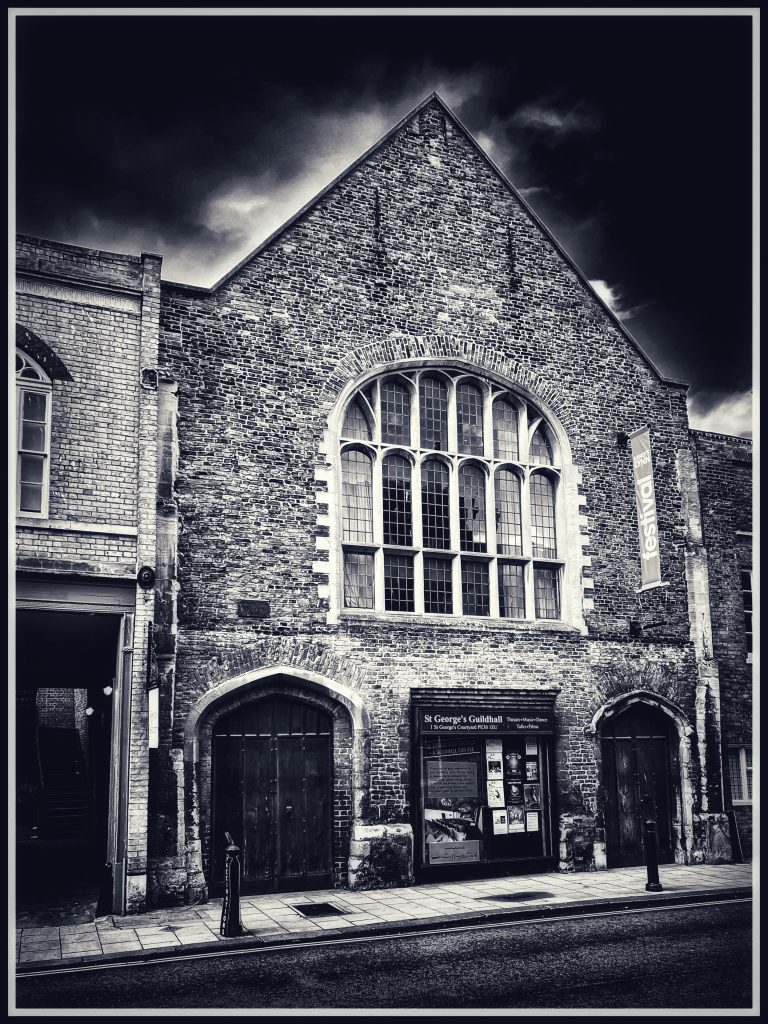“Oh! my husband, my husband … At which shrill and unexpected outcry, the people about her moov’d to a strange amazement, inquired the reason of her clamour.”
Thomas Heywood (1612) An Apology for Actors
The Cry

Thomas Heywood was an English actor and playwright and in 1612 published his memoirs (An Apology for Actors). In the book he gives a vivid account of an incident that took place in a theatre in King’s Lynn. Although the guildhalls of the Holy Trinity and of Corpus Christie were known to have occasional theatrical performances, they most frequently took place at St George’s Guildhall.
In 1592/93 the Earl of Sussex players were performing the History of Fryer Francis in which a woman starts to become very attracted to a younger man. In order to remove blocks to her affection she secretly murders her husband. The husband’s ghost haunts the woman throughout the play, often appearing to her.
Heywood reports that as all this was happening on the stage, a woman in the audience, “till then of good estimation and report”, becomes extremely troubled. She cries out: “Oh! my husband, my husband! I see the ghost of my husband fiercely threatening and menacing me!”
The Murder
When her fellow theatre goers seek to comfort her and find out what is wrong, she tells them that seven years ago she was obsessed with a man (whom she names) and that she poisoned her husband. She has been troubled by his ghost ever since.
She was later taken to the Justices, further examined. On her confession, she was condemned.
Of course, there is much more that we want to know, and don’t know. Was the woman subject to mental illness? Was she imagining these things? Did she really kill her husband? If she did, what happened to the body? What was her name? Was she executed?
Regardless of the questions that a modern reader would have, Heywood stands by the authenticity of the story. “That this is true, as well by the report of the Actors as the records of the Towne, there are many eye-witnesses of this accident yet living locally to confirme it.”
It Grows
The story was remarkable, and if true, shows the power that theatre can have on the audience. It must have spread rapidly throughout the acting community. And it receives a reference in another Elizabethan drama .
In Act IV , scene 2 of A Warning for Faire Women (1599) Anonymous writes:
A woman that had made away her husband,
And sitting to behold a tragedy,
At Lynn, a town in Norfolk,
Acted by players travelling that way, –
Wherein a woman that had murdered hers –
Was ever haunted with her husband’s ghost.
The passion written by a feeling pen,
And acted by a good tragedian, –
She was so moved with the sight thereof,
As she cried out, “The play was made by her,”
And openly confessed her husband’s murder.
A Warning for Faire Women (1599) The play was registered by William Aspley
Enter William Shakespeare
Hamlet is one of Shakespeare’s most famous protagonists who delivers some great soliloquies. One central theme of the play is the instability that results from an individual trying to work out if what a ghost says about a murder is true.

The dates are interesting. We know that Hamlet was written in 1601. We also know that in 1593, when the London theatres were closed because of the plague, the Earl of Pembroke’s men were acting in Lynn at St George’s Guildhall. A certain William Shakespeare was an actor and playwright performing with the Earl of Pembroke’s men. It is highly likely that he had heard of the confession to the murder – either directly from people in Lynn, from A Warning for Faire Women, or from the general acting community.
In Act II, scene 2, Shakespeare gives Hamlet these words:
I have heard
That guilty creatures sitting at a play,
Have by the very cunning of the scene
Been struck so to the soul, that presently
They have proclaimed their malefactions.
Hamlet (1601)
Perhaps the people of Lynn not only hosted the Bard in 1593, but actually made it into one of his greatest plays in 1601?
© James Rye 2023
See also St George’s Guildhall.
Book a Walk with a Trained and Qualified King’s Lynn Guide
Sources
- Anonymous (1599) A Warning for Faire Women, https://archive.org/details/warningforfairwo00unknuoft
- British Library Newsletter, Reference to a play which prompts a murderer to confess in A Warning for Fair Women, 1599, https://www.bl.uk/collection-items/reference-to-a-play-which-prompts-a-murderer-to-confess-in-a-warning-for-fair-women-1599
- Gifford, A. (1986) Ghosts and Legends of Lynn, Amaryllis Press Ltd.
- Heywood, T. (1612) An Apology for Actors, https://archive.org/details/apologyforactors0000heyw
- Hillen, H. (1907) History of the Borough of King’s Lynn Vol.2, EP Publishing Ltd.
- Lee, P. (2021) The Ghosts of Lynn and West Norfolk, Independently published

[…] See also The Cry, The Murder, Lynn and the Bard. […]